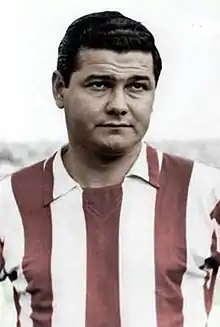 | |||
| Personal information | |||
|---|---|---|---|
| Full name | Eulogio Ramiro Martínez | ||
| Date of birth | 11 June 1935 | ||
| Place of birth | Asunción, Paraguay | ||
| Date of death | 30 September 1984 (aged 49) | ||
| Place of death | Barcelona, Spain | ||
| Height | 1.74 m (5 ft 9 in) | ||
| Position(s) | Striker | ||
| Youth career | |||
| Atlántida | |||
| Senior career* | |||
| Years | Team | Apps | (Gls) |
| 1953–1956 | Libertad | ||
| 1956–1962 | Barcelona | 111 | (62) |
| 1962–1964 | Elche | 39 | (7) |
| 1964–1965 | Atlético Madrid | 2 | (0) |
| 1965–1966 | Europa | 10 | (3) |
| Calella | |||
| International career | |||
| 1954–1955 | Paraguay | 9 | (4) |
| 1958 | Spain B | 1 | (0) |
| 1959–1962 | Spain | 8 | (6) |
| 1956 | Catalan XI | 1 | (0) |
| *Club domestic league appearances and goals | |||
Eulogio Ramiro Martínez (11 June 1935 – 30 September 1984) was a Paraguayan-born footballer who played as a striker. He played for the Spanish side FC Barcelona in the 1950s and 1960s, and is remembered for being a prolific striker with an excellent finishing ability.
He was reputed to be the creator of the "Martinez Turn", which can be seen on Movietone footage of Barcelona's quarter-final match against Wolves in the 1959–60 European Cup. This move later received worldwide acclaim as the "Cruyff Turn" and although Johan Cruyff was at Barcelona when he demonstrated it in the 1974 World Cup, Martinez has never received any credit despite using it at least 14 years earlier.
Club career
Years at Barcelona
After leading Club Libertad to a Paraguayan League title in 1955, Martínez drew the attention of FC Barcelona who eventually signed him in 1956. Martínez soon showcased his talent in Barcelona by leading the team in scoring in three seasons (1956–57, 1957–58, 1959–60), obtaining two Spanish League titles, two Copas del Rey and two Inter-Cities Fairs Cups.[1][2]
Martínez also became part of FC Barcelona's history by scoring the first goal ever at their current stadium, Camp Nou, on 24 September 1957. The goal was scored in the 11th minute, in a friendly match celebrating the inauguration of the stadium against a Polish team. Barcelona won the match 4–2.[3]
Another impressive accomplishment by Martínez while playing for FC Barcelona was when he scored seven goals in one match, in an 8–1 victory over Atlético Madrid in a Copa del Rey tie played on 1 May 1957.[4]
Post-Barça Years
Hampered by being overweight, he left FC Barcelona in 1962, having scored 111 goals in 162 official matches. He went on to play for Elche, Atlético Madrid, and CE Europa.
Club statistics
| Club performance | League | |||
|---|---|---|---|---|
| Season | Club | League | Apps | Goals |
| Spain | League | |||
| 1956–57 | Barcelona | La Liga | 23 | 9 |
| 1957–58 | 19 | 10 | ||
| 1958–59 | 16 | 7 | ||
| 1959–60 | 24 | 23 | ||
| 1960–61 | 13 | 4 | ||
| 1961–62 | 16 | 9 | ||
| Total | 111 | 62 | ||
International career
Martínez played for both Paraguay and Spain. For Paraguay he had 9 caps and 4 goals. For Spain he had 8 caps and 6 goals, and was part of the Spanish team that played at the 1962 FIFA World Cup. He played the opening game, a 1–0 defeat against Czechoslovakia, but was dropped from the team afterwards.[5]
Spain International goals
| # | Date | Venue | Opponent | Score | Result | Competition |
|---|---|---|---|---|---|---|
| 1. | 22 November 1959 | Mestalla, Valencia, Spain | 4–1 | 6–3 | International Friendly | |
| 2. | 17 December 1959 | Parc des Princes, Paris, France | 4–2 | 4–3 | International Friendly | |
| 3. | 13 March 1960 | Camp Nou, Barcelona, Spain | 3–1 | 3–1 | International Friendly | |
| 4. | 15 May 1960 | Santiago Bernabéu, Madrid, Spain | 2–0 | 3–0 | International Friendly | |
| 5. | 15 May 1960 | Santiago Bernabéu, Madrid, Spain | 3–0 | 3–0 | International Friendly | |
| 6. | 14 July 1960 | Nacional, Santiago, Chile | 0–4 | 0–4 | International Friendly |
After retirement
After retiring in 1966, he established himself in the Catalan town of Calella. In 1984, he was run down by a car while changing a flat tire. He spent 23 days in a coma before dying on 30 September 1984.[6]
Honours
- Club Libertad
- Paraguayan League: 1955
- FC Barcelona
- Inter-Cities Fairs Cup: 1955–58, 1958–60
- Spanish League: 1958–59, 1959–60
- Spanish Cup: 1956–57, 1958–59
- Atlético Madrid
- Spanish Cup: 1964–65
See also
References
- ↑ "Eulogio Martínez, el abrelatas del Barcelona" (in Spanish). Marca. 22 February 2020.
- ↑ "Kokito Martínez, un gran valor que dio el fútbol paraguayo" (in Spanish). Diario Hoy. 11 June 2016.
- ↑ "Camp Nou – Brief history". Archived from the original on 3 October 2009.
- ↑ "Un cañonero en la memoria de todos". Mundo Deportivo. 26 October 1984. p. 2.
- ↑ "FIFA Report Match". Archived from the original on 1 August 2009.
- ↑ "Historia del fútbol mundial".
External links
- Eulogio Martínez at BDFutbol
- National team data (in Spanish)
- Eulogio Martínez at National-Football-Teams.com
- FC Barcelona archives (in Spanish)
- FC Barcelona profile
- Eulogio Martínez – FIFA competition record (archived)